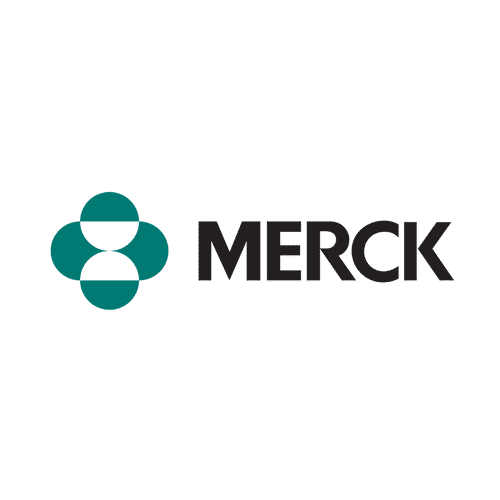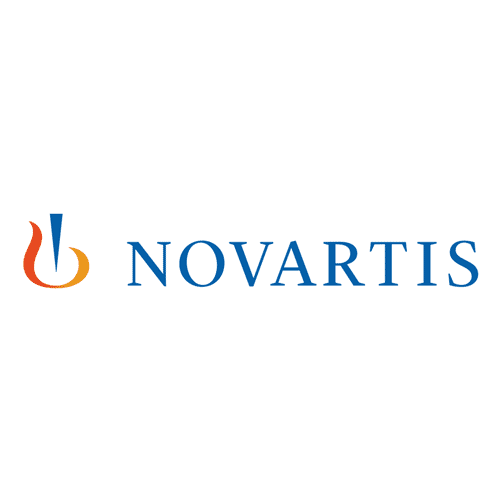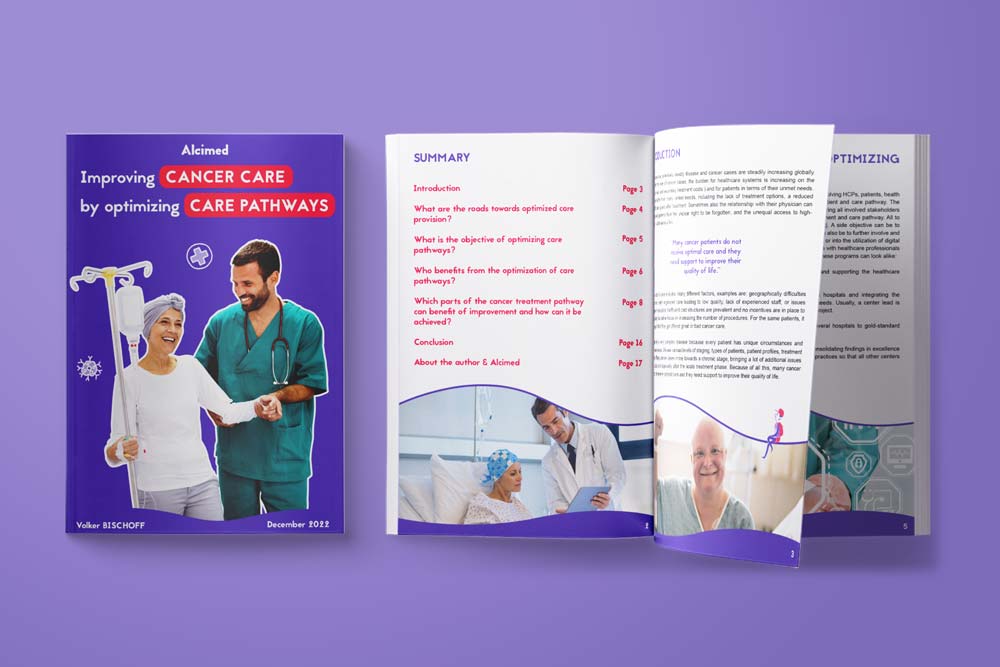
Patient pathway

Innovate and reinvent patient care pathways
The Alcimed Healthcare team has established acknowledged expertise in the analysis and optimization of patient care pathways, and helps its clients to interpret and improve patients’ therapeutic and emotional pathways, as well as the role and coordination of key stakeholders (healthcare professionals, patient associations, relatives or caregivers, etc.) in patient pathways, starting from the pre-diagnosis to follow-up phases, both in and outside the hospital setting (patient’s home, retail clinics, etc.).
They trust us









The challenges related to patient pathways
The efficiency of care pathways is a key problem area for all those involved in the healthcare system, who face their own challenges:
- Patients, who become increasingly involved in their care, are looking to access the best treatments, to improve their quality of life, to clear understandable information about their health, to better control their emotions, and to access comprehensive services with coordinated care, in order to maximize their chances of recovery. The foregoing necessarily implies increased clarity of the care pathway, the roles of each stakeholder involved throughout the patient care pathway, the solutions (products and services) available to patients, and an understanding of the emotional impact of their disease.
- Healthcare authorities, who are tasked with making the healthcare system more efficient and modern, by guaranteeing safety and quality of care at the local, regional, and national level, curbing inequality in access to care –which varies greatly from one territory to another– while limiting healthcare expenses and specifically hospitalization expenses (the shift to outpatient care or homecare are examples of solutions for reducing hospitalizations implemented by many countries).
- Accordingly, healthcare professionals, seek ongoing improvement in their practices in order to provide the best possible care for their patients, better coordination with all the stakeholders in a sector (private, hospital, medico-social, institutions, health insurance and insurers, etc.), and support from state structures to facilitate patient management, for example by managing patient data.
- Healthcare manufacturers and suppliers of drugs and medical devices play an active role in the process of improving care pathways through various actions, such as bringing value to patients, doctors, healthcare authorities, and beyond their products: through funding and implementing patient pathway optimization programs, by developing solutions and services (e.g. mobile applications for monitoring treatment, medical telemonitoring solutions, information and testimonial videos, information leaflets, patient support programs, etc.) or, for example, by setting up new roles and responsibilities at the interface between industry and private/hospital (e.g. MSL –Medical Science Liaison– who are becoming fundamental stakeholders in regional healthcare ecosystems). All of these actions help to establish the healthcare industry manufacturers in an even more public position.
- And many other stakeholders who face their own challenges and have a fundamental role in care pathways, such as home care providers, pharmacists, insurers, caregivers, etc.
More generally, many challenges affect all the stakeholders involved, starting with the patient, and can be optimized by establishing a process to optimize the care pathway, including:
Diagnosis time is a major problem area in many care pathways, leaving patients to “therapeutic wandering”, while they impatiently wait to be informed of the causes of their symptoms and to receive the appropriate treatment. One of the main levers for reducing diagnosis time is informing and training healthcare professionals. Many diseases, like rare diseases, are indeed either undiagnosed, or confused with others, through ignorance of their existence, or a lack of knowledge or expertise to detect them. Many tools can be used to conduct a quicker diagnosis and, thus, maximize the chances of recovery.
What tools or methods should be implemented in order to speed up diagnosis? How do you inform and train healthcare professionals in order to reduce diagnosis time?
Coordination and referral between healthcare professionals is another major challenge in the patient pathway, insofar as the management of a chronic disease requires a multidisciplinary approach and coordinated care, thus, involving several stakeholders from different departments, structures, and locations, between primary and specialty care. Many treatment plans remain complex, underinformed, or completely lacking information and clear processes, consequently leading to patient stagnation in their care pathways or major delays in accessing the right healthcare professionals and the right treatments.
How do you set up a clear and shared referencing process at the local level? What tools can facilitate exchanges between healthcare professionals throughout the care pathway?
Although many patients are increasingly active in managing their pathology, many obtain little information besides their interactions with healthcare professionals. There are several means in place today to: keep up-to-date on new treatments, discuss and share daily life and best practices with other patients or caregivers, become involved in a patient association to help other patients, and thus improve well-being and quality of life.
What actions should be implemented in order to foster patient activation and engagement? By what means and how should direct action be taken with patients?
Another major challenge is the management and use of data gathered over the course of patient pathways. Large amounts of data from patient medical records are gathered by various stakeholders regarding patients, the evolution of their diseases (age at diagnosis, type of screening, side effects, disease progression, etc.), and quality of care, and could provide for cross-analyses with a view to global innovation and improved pathways. At present, well beyond ethical debates, a large amount of data is underused and remains compartmentalized. In France, for example, initiatives such as the Health Data Hub –a platform for centralizing data from various organizations– has emerged and paved the way for new projects with varied perspectives: basic research, drug development, monitoring of their real-life uses, and optimization of care pathways (prevention, hospital care, and patient monitoring).
What data can be shared between those involved throughout the care pathway? How is this data collected and used to improve the pathways?
In order to optimize the care pathways and channels, it is necessary to monitor over time the performance of the actions implemented and ongoing improvement of the processes. Accordingly, defining indicators and sharing them within the multidisciplinary teams involved means the optimization process can be preserved over time. The indicators can include: the number of patients involved in a framework, the satisfaction of patients and/or healthcare professionals, cutting waiting time, or the number of patients monitored in a department. These indicators make the change tangible and quantifiable and make it possible to forecast the evolution of sectors over time.
Which indicators should be defined for optimizing care pathways? How do you bring to life the sharing and monitoring of performance within a sector?
The healthcare sector’s impact on the climate and its dependence on fossil energy resources are significant, as illustrated by a recent report by the Shift Project in France, where the healthcare system is responsible for 8% of total greenhouse gas emissions. Reinventing care pathways and associated practices by integrating environmental considerations opens up an unprecedented window of opportunity to improve patient outcomes while improving the sustainability of care pathways (digitalization of certain practices such as teleconsultations or mobile monitoring applications, medical self-diagnosis, home care, prevention strategies, etc.).
How do you reduce the environmental impact of care pathways? How do you encourage and promote the eco-design of patient care pathways?
How we support you in your projects related to patient pathways
Alcimed helps its clients to understand the steps of a patient pathway and to imagine and implement practical solutions to optimize them. The core goal of the projects we conduct regarding patient pathways is to improve a healthcare sector’s performance at the local or regional level, in order to create value for patients, healthcare professionals, healthcare authorities, and pharmaceutical companies.
Our projects cover topics as diverse as understanding the overall challenges of a care pathway for a given disease or treatment, conducting multidisciplinary advisory boards to identify best practices and co-define an ideal model of care, setting up a community of practices, mapping patients’ emotional pathways and developing services to improve them, training local teams of pharmaceutical companies to help them run pathway-based projects, and much more!
Based on this experience, our team has developed a dedicated methodology that has been implemented in more than a hundred projects around the world (in Europe, the United States, Latin America, Asia, the Middle East, etc.) and across a wide range of issues and therapeutic areas (e.g. respiratory diseases such as pulmonary arterial hypertension or interstitial lung disease, cardiovascular diseases such as stroke or hypercholesterolemia, but also in oncology, neurology, gastroenterology, hepatology, etc. ), and which we have called PEPS for ” Patient pathway Efficiency ProgramS”.
Most of our projects are initiated at the local or regional level. The objective is to improve the patient flow and optimize care both in and outside of the hospital, by working in close collaboration with the various stakeholders involved throughout the pathway (diagnostic centers, hospitals, home care workers, patient associations, etc.). As the issues and contexts very often differ from one geography to another, our aim in these projects is to start from the local context of each center or each branch locally and to co-construct concrete and simple solutions, to which key impact indicators are associated.
Overall, our in-depth knowledge of all players involved in patient pathways (pharmaceutical companies, medical device companies, biotechs, health authorities, national and regional institutions, patient associations) and the diversity of projects we are conducting in this field imply that we can quickly understand the pain points of a patient pathway, adopt a tailored, flexible approach and highlight the key challenges that need to be addressed to help our clients move forward.
What they say


"The Alcimed team has allowed us to structure the project appropriately, to plan it in the best possible way, and to make sure that every single step of the project was successful."
Federico Bianco
Head of the Special Care Unit
Examples of recent projects carried out for our clients in patient pathway
Optimizing the care pathway for rare diseases patients in Europe
We assisted the European Medical Management of a pharmaceutical company to optimize the care pathway and emotional management of patients suffering from a rare respiratory disease in several European countries.
As this rare disease is difficult to diagnose and often confused with more common respiratory diseases, the time required to diagnose patients was too long (2 to 3 years). Our client wished to position itself as a public health player by providing hospitals (3 centers per country, in different countries) with Alcimed’s service for:
- Diagnose the current coordination of care between the different healthcare actors involved in the patient pathway.
- Co-define with this multidisciplinary team an ideal patient management model and an associated action plan.
- Implement the actions defined at the local and national level.
The result for our client? A reduction in patient diagnosis time and an overall improvement in physician coordination, an increase in therapeutic management and a change in the sales team’s stance.
Optimizing the emotional journey of patients with rare diseases
One of our clients, a leading pharmaceutical company, wanted to improve the care of patients suffering from a rare disease by developing a high value-added service offering that would improve their well-being or quality of life throughout their care pathway (from diagnosis to palliative care).
To do this, our team interviewed patients, patient support workers and associations in each country involved in order to map their emotions and to identify the levers for improving their well-being and quality of life that could be addressed by developing services. Following this, our team pre-tested these service ideas with healthcare professionals, before organizing a workshop to co-construct a service development roadmap with our client’s medical and marketing teams.
Ultimately, several services were deployed in the pilot countries and then extended to other countries in the zone, improving the emotional pathway of patients and positioning our client as a major player in public health.
Supporting a pharmaceutical company in optimizing the care pathway for patients with chronic diseases in a dozen French regions
Noting numerous local problems in the patient care pathway (abnormally long diagnosis time, problems with referrals between caregivers, poor legibility of the pathway, etc.), a leading pharmaceutical company called on our team to optimize the care pathway of patients with chronic diseases and facilitate their global management at the local level in a dozen regions in France.
Following our PEPS methodology (Patient Pathway Efficiency Program), the first step of our project consisted in selecting pilot centers and training multidisciplinary teams within these centers. Our team then conducted a diagnosis of the care chain by discussing with all key stakeholders involved in the patient pathway, and then co-defined with the pilot teams of each center an ideal operating target to be reached and an associated improvement action plan.
Finally, we supported the center teams in the definition of key performance indicators (KPIs) and in implementing the co-defined actions through to the analysis of the impacts of these actions, in order to finally implement the most value-creating actions at the regional level.
Deciphering the patient pathway of persons with type 2 diabetes in Germany
For a medical device player wishing to enter the type 2 diabetes market in Germany, Alcimed analyzed the key stages of the patient pathway, from diagnosis to therapeutic follow-up, the stakeholders involved and the main barriers and uncovered patient needs.
As a result, we were able to identify that our client’s product in its current version did not meet market expectations, and recommended to our client the target characteristics that were essential, and those that were less of a priority, to successfully enter the German market.
Structuring care pathways for people with a rare disease in the French Overseas Territories
There are specific territorial challenges in the French West Indies and French Guyana that impede or delay access to care for patients (due to insularity, distance from mainland France, or the fragility of medical resources). Based on these observations and on the need for adequate territorial medical specialties and resources, a pharmaceutical company wished to decipher and structure the care pathway for patients suffering from a rare disease within the Caribbean region.
To do so, we used the tracer methodology to analyze the steps experienced by patients, along his or her care pathway, as well as their feelings and those of their family and/or caregivers. We then compared this initial vision with that of the local healthcare professionals involved in the care pathway. This detailed analysis of the care pathway, incorporating the experiences of patients and their families as well as the vision of healthcare professionals, enabled us to conduct workshops that led to a concrete action plan to implement solutions tailored to local context and stakes and developed by multidisciplinary and multi-professional teams.
Finally, we supported our client in defining a strategy to share results on a broader scale through a scientific publication, along with an internal and external communication plan.
Optimization of the pre-diagnosis pathway and patient referral in a rare disease context for a pharmaceutical company
Alcimed assisted a pharmaceutical player in analyzing the pre-diagnosis pathway of patients suffering from a rare hematological disease in France, and in optimizing patient referral towards expert care centers.
To do so, we investigated the main steps towards diagnosis, the associated timeframes and the interactions between HCPs involved (key exams conducted, patient referral practices, etc.). To this end, we interviewed HCPs from both referring and expert centers to decipher main pain points of the pre-diagnosis pathway (with regards symptom detection, knowledge of the disease, conduction of exploratory exams, referral process towards expert centers, etc.). This analysis was complemented by a review of existing and most recent data of the pathology and its care management (national patient registry, local epidemiology data, etc.). Finally, the patients’ vision and experience was integrated in the analysis thanks to a patient questionnaire developed in collaboration with the national patient association.
This project enabled our client to have an in-depth analysis of the care pathway upstream from the expert centers, that integrates the patients’ voice on top of HCPs’ vision. This facilitated the identification of strategic priorities for our client and concrete action levers to facilitate patient referral and reduce diagnostic wandering.
Understanding of the current care practices for a pharmaceutical company to prepare the indication extension of its onco-hematology treatment
Alcimed supported a pharmaceutical company in preparing the launch of their existing second-line product as first-line treatment option for a hematological syndrome.
To do so, we deciphered the patient first-line care pathway, from symptoms onset to first prescription, via interviews with HCPs responsible for diagnosis and treatment initiation (hematologists and nurses). It enabled us to identify good practices to leverage and the main pain points to anticipate ahead of the product launch in first line. We also looked into the perception of HCPs regarding first-line current treatments, along with main criteria justifying the selection of a specific first-line treatment option. This was challenged during internal workshops with our client’s teams to identify differentiation levers to activate and to define the key communication axes to maximize adoption by HCPs.
In the end, this investigation helped us in defining a clear and wining positioning for our client’s treatment as first-line option, strategic priorities for successful launch and operational implications with regards to communication campaigns.
You have a project?
To go further
Healthcare
Position Paper Alcimed – Improving cancer care by optimizing patient pathways
What is the impact of coordinated primary care on the French health system? Alcimed highlights the primary care organizations and the major turning point they represent in the field of local care.
Healthcare
Point Of Care Tests (POCT) in France, what are the prospects for patient pathways?
What if POCTs were the answer to a number of public health challenges? Discover the potential changes they could bring to French patient pathways.
Healthcare
3 tips for building the future care pathway
Emergency room crisis, doctor shortage, ecology... The future care pathways must respond to a variety of challenges. Here are 3 tips to help you build them.
Founded in 1993, Alcimed is an innovation and new business consulting firm, specializing in innovation driven sectors: life sciences (healthcare, biotech, agrifood), energy, environment, mobility, chemicals, materials, cosmetics, aeronautics, space and defence.
Our purpose? Helping both private and public decision-makers explore and develop their uncharted territories: new technologies, new offers, new geographies, possible futures, and new ways to innovate.
Located across eight offices around the world (France, Europe, Singapore and the United States), our team is made up of 220 highly-qualified, multicultural and passionate explorers, with a blended science/technology and business culture.
Our dream? To build a team of 1,000 explorers, to design tomorrow’s world hand in hand with our clients.
Patient pathway or care pathway refers to all the stages a patient experiences in the management of his or her disease, from pre-diagnosis to palliative care. Thus, the various stages of a patient’s care pathway are mainly carried out by private healthcare professionals, in hospitals, in healthcare establishments, in medico-social structures or at the patient’s home: consultations with general practitioners or specialists, diagnostic or screening procedures, various treatments, home monitoring, etc.
Their aim is to ensure access to safe, effective, and coordinated care, and to personalized prevention strategies, all of this within a sustainable economic framework for the healthcare system.
Patient pathway optimization projects are collaborative initiatives usually involving healthcare professionals, patients, healthcare institutions and industry players. They are opportunities for industry players to create value beyond their products and have a greater impact on society. More broadly, they contribute to improving the level of diagnosis and access to care as well as optimizing care management practices along the patient pathways, which translate into better medical outcomes and quality of life for patients. They can also help to raise awareness about a disease, optimize medical resources’ usage and favor collaboration and team work between main stakeholders.




